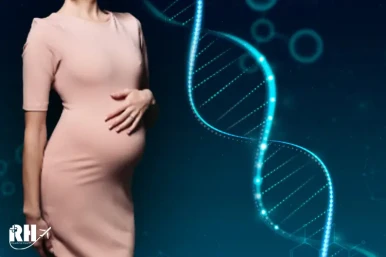Surrogacy and Genetics: Are the Baby’s DNA and Appearance Affected?
Fertility Treatment
when couples struggling with infertility face challenges such as recurrent miscarriages or embryo implantation failure, doctors may recommend surrogacy as the only solution for having a baby. However, many intended parents worry: Will the baby still be biologically ours if carried by a surrogate? Will the child resemble us or the surrogate mother? Can the surrogate pass on her DNA or genetic diseases to the baby?
In this article, we answer these questions and explain how genetics and appearance are affected in a surrogate pregnancy.
Is the Surrogate Mother Genetically Related to the Baby?
The influence of a surrogate mother’s DNA on the baby depends on the type of genetic exchange involved and the type of surrogacy.
/62_1756808272_large_1758351276_large.webp)
Partial Genetic Exchange (Gestational Surrogacy)
Partial genetic exchange in surrogacy is the carrying of an embryo in the womb of a surrogate mother that is formed from the egg and sperm of the original parents (the applicant couple) in vitro. In this case, the child inherits 50% of the genetic characteristics from the owner of the egg (the mother) and the other 50% from the owner of the sperm (the father). The resulting embryo, by implanting and growing in the womb of the surrogate mother, benefits solely from environmental conditions, which include effects such as blood contact, access to nutrients, exposure to medications, and, to a small extent, two-way exchange of fetal cells.
Full Genetic Exchange (Traditional Surrogacy)
If the surrogate mother’s own egg is used and fertilized with the father’s sperm, the baby will inherit DNA and physical traits from the surrogate. This option is less common and usually chosen when intended parents cannot use their own eggs.
Genetic Screening in Surrogacy
One of the biggest advantages of IVF surrogacy is the ability to reduce genetic risks that are not controllable in natural pregnancies. Since fertilization happens in a laboratory, doctors can use advanced methods to ensure healthy embryo development.
/52_1756808431_large_1758351377_large.webp)
Choosing a qualified surrogate mother
In natural pregnancies, women may not be aware of their uterine problems or hidden chromosomal issues, which can increase the risk of complications or hereditary diseases in the baby. In gestational surrogacy, however, the surrogate must meet strict medical requirements: she should be between 20–35 years old, have had at least one successful pregnancy, and undergo multiple medical and fertility tests. This ensures a safe, healthy womb for carrying the baby to term and gives intended parents peace of mind.
Selecting the best embryo
During IVF, multiple embryos are created. Embryologists select the most viable one—those with healthy cell division and growth—to increase the chances of a successful pregnancy while minimizing risks such as miscarriage, premature birth, or low birth weight.
Genetic Testing in Surrogacy
Pre-implantation genetic testing (PGT) helps identify chromosomal abnormalities and inherited conditions. Only healthy embryos are transferred to the surrogate, significantly increasing the chance of a safe pregnancy. Couples may also choose gender selection if legally permitted.
/63_1756808138_large_1758351438_large.webp)
Why Choose Surrogacy in Iran?
Iran has become one of the leading destinations for international patients seeking affordable surrogacy and infertility treatments abroad. Surrogacy in iran with experienced doctors, modern fertility clinics, and advanced technologies with genetic testing, couples can safely achieve their dream of parenthood at a fraction of the cost compared to the US or Europe.
Final Word
Intended parents often fear that their child might resemble the surrogate mother. However, in gestational surrogacy—where the embryo is created using the intended parents’ egg and sperm—the child’s DNA comes only from them.
If donor eggs are used, choosing a donor with physical similarities to the intended mother can help ensure resemblance.
Contact us for a free initial consultation about Surrogacy
FAQs About Genetic and Gestational Surrogacy
1.Who will the baby look like in surrogacy?
The baby will resemble the biological parents who provided the egg and sperm, not the surrogate.
2.Can a surrogate mother’s lifestyle affect the baby?
Yes. Unhealthy behaviors such as smoking, drinking alcohol, drug use, poor diet, or exposure to toxins can harm the baby’s development and DNA. That is why surrogate mothers must folow a healthy lifestyle during pregnancy.
 WhatsApp
WhatsApp
 Telegram
Telegram
 Facebook
Facebook
 Email
Email

No reviews
Your comment